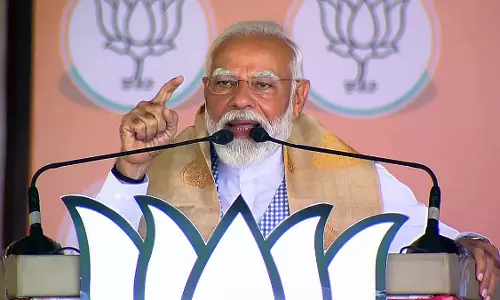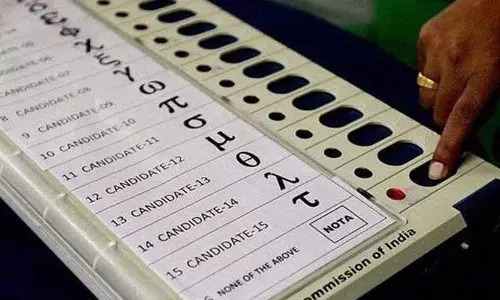
Once again against imposing Hindi
text_fieldsWhen Dr Kasturirangan Committee, appointed by the Central government, has submitted the draft of the National Education Policy and the deadline for public to register their views has been fixed as 30 June, naturally enough comments and criticism have been aired about the suggestions and recommendations in the draft.
It remains to be seen how many of them will be considered - and accepted. For, the governance of India has fallen into the hands of Hindutva forces whose chief focus is clearly on the Hinduisization of generations, and the man most suitable for that, Ramesh Pokhriyal has been appointed human resource development miniser. The draft contains proposals such as that a method of education based on the veda-gurukula model should be encouraged, and yoga, astrology and vastu shastra should be given emphasis on a par with mathematics and science subjects. The Kasturirangan Committee report also proposes that study of Sanskrit should enjoy accent at school and at higher education levels. In addition, when the Commission recommends that moral values should be taught from standards 6 to 7, the ulterior motive is all to clear.
But the part that made immediate provocation is concerning the study of Hindi language. What caused heated controversy across Tamilnadu, West Bengal and Andhra is the proposal that Hindi should be taught in addition to English, a demand that goes in line with the long-cherished slogan of Hindu- Hindi-Hindustan by Hindutva advocates. Kasturirangan Committee argues that this recommendation is nothing different from the three-language scheme in force since 1968 in the country, but non-Hindi states counter that contention. In Tamil Nadu, currently the compulsory language is English in addition to Tamil. Hindi is just one among the optional languages taught as third language. And those ranged against the new education policy in Tamil Nadu - once the scene of fierce agitations against the Centre's move to impose Hindi - include not only the DMK, but even NDA's constituent party, AIADMK. In fact the anti-Hindi movement was a sub-product of the independent Dravidistan movement under the leadership of EV Ramaswamy Naicker five decades ago. The Centre had finally to bow before the agitation and step back from the move to make study of Hindi compulsory.
The Narendra Modi government, at the time of entering its second term, seems to have recognized the inherent risks in going for an adventure in Tamil Nadu, where BJP has suffered a serious setback, and as such it was wise of them to have corrected the position. Thus the Human Resource Ministry has made it clear that the central government does not have any intention to impose Hindi in the name of three-language formula. As per the correction in the language formula of the draft policy, students have to study the regional language, English and another language of their choice. If that is so, students will naturally opt for another language that is actively used for communation at a global level. It is thus probable for the classic vedic language of Sanskrit to be discarded. The proposal in the educational polilcy referred to above, regarding the importance of Sanskrit, probably is intended to not let that happen.
In fact, whichever it be, language is primarily a means of communication and a medium to be used in the realms of knowledge, literature and arts. For the same reason, hundreds of languages have become part of history in the world, and many have become nearly dead; a much fewer number of them survive as active languages. There is also a case in history of successfully reviving a dead languge driven by extreme nationalism – Hebrew the scriptural language of Israelites. But, as opposed to Sanskrit in India, Hebrew is the official language of Israel; it is also a language of media. The fact is that Israel being a country formed by Jewish settlers from all around the globe, and on the conviction that there was need for a common language to be used by them all, Hebrew was introduced as a unifying force. But that is not the case with Sanskrit. The government says that Hindi is spoken by 54 per cent of the country's population. Therefore, Hindi is India's official language as per the constitution itself. And English, along with Hindi, was also designated as a parallel official language in recognition on of the fact that Hindi was alien to people in the south and east of the country. When that state of affairs has not yet significantly changed, any move to impose Hindi will only lead to disunity and disingetration of the country. Bengali, Tamil, Telugu, Kannada and Malayalam are also langugaes that carry the spirt of Indian culture and sufficiently reflect the thoughts and feelings of the nation. The country is bound to weaken, if any one rides roughshod inebriated with power, ignoring the fact that diversity is the unique feature of India and the strength of the country consists in maintaining it, and the the fundamental principle of democracy is unity in diversity. If Hindi, contrary to the current trend, is simplified to the maximum and everything possible is done quietly for its propagation, it may not be difficult to make the the official language acceptable to all.























